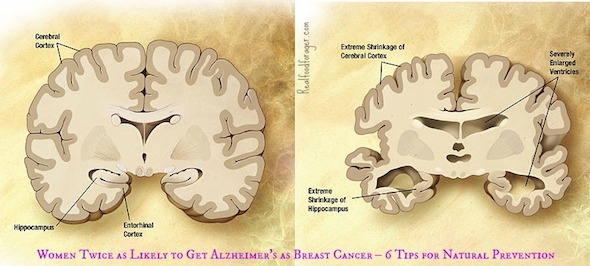It was all over the news today – woman are twice as likely to develop Alzheimer’s as they are breast cancer. Shocking, when you think about the millions of dollars spent on breast cancer. Not that I’m saying we shouldn’t spend money on breast cancer – just that Alzheimer’s is an iatrogenic disease, brought on by Big Pharma and Big Ag. There are steps you can take to PREVENT it in the first place.
Alzheimer’s is Iatrogenic
Iatrogenic means it is induced by doctors. I use the word loosely. In this case, I mean that it is mainly induced by the standards and protocols set by the FDA – standards and protocols which are orchestrated by Big Pharma and carried out by the doctors. What I am talking about is perhaps the number one cause of the Alzheimer’s and dementia epidemic we are seeing today.
The number one cause is the widespread use of cholesterol lowering drugs, based on poor science. Statin labels must now include warnings about the rare but serious risk of liver damage, memory loss and confusion, and type 2 diabetes. Certain statins, such as simvastatin, can also raise the risk of muscle weakness – a rare but very serious disorder called Rhabdomyolysis.
According to the Centers for Disease Control and Prevention, more than 1 in 3 older women — 36% of those between 64 and 74 and 39% of those 75 and over — take statins in an attempt to prevent a first heart attack or to ward off a repeat heart attack. Almost half of all men in those age brackets take a statin.
Recently they admitted that being on a statin can lead to diabetes. Interesting. Diabetes is a risk factor for heart disease, yet heart disease is what the statin is supposed to ultimately prevent. Diabetes is also a risk factor for memory loss. Double whammy.
Another compelling reason to avoid statins is because they again recently admitted that long term use of statins can cause memory loss. This is not surprising because in order for the nerve cells in the brain and peripheral nervous system to communicate with each other, they need cholesterol. We need cholesterol for proper brain function.
The Food and Drug Administration website now carries this warning:
FDA has been investigating reports of cognitive impairment from statin use for several years. The agency has reviewed databases that record reports of bad reactions to drugs and statin clinical trials that included assessments of cognitive function.
The reports about memory loss, forgetfulness and confusion span all statin products and all age groups… these experiences are rare but that those affected often report feeling “fuzzy” or unfocused in their thinking.
Yet, statins are still being prescribed in support of the $26 billion in annual sales they generate for Big Pharma.
Tip #1: Avoid Statins – Embrace Your Cholesterol
Cholesterol is an essential part of the cell membrane. It makes up part of the bi-layer phospholipid membrane that keeps nutrients in the cell and toxins out. This cell membrane has a certain fluidity to it. When it is made up of the wrong fats (from trans fats and polyunsaturated fats) the membrane may be too fluid or too stiff and lose it’s protective quality by allowing small molecules into the cell that otherwise should not be there.
The cholesterol molecule is the basic building block for all the steroid hormones in the body. Additionally, in order to digest and assimilate fats, the body makes a substance called bile. Bile acids are crucial to the breakdown and absorption of fats. To make bile, the liver uses cholesterol. Therefore, you need cholesterol to digest fats.
As with any health issue, read more about the subject. You will really need to own it before making changes in your health care. Then, have a conversation with your medical provider about whether or not you really need to be on a statin. This is a decision between you and your medical provider.
See Avoid Statins: Embrace Your Cholesterol for futher information.
Tip #2: Avoid Trans Fats
In a study published in the juried medical journal, Neurology, December 28, 2011, researchers from the Oregon Health & Science University found that people with high levels of trans fats in their blood had significantly worse cognitive performance and less total brain volume.
In other words, the study indicated that eating foods high in trans fats — mostly junk food, like processed pastries, packaged foods and margarine –- may cause brain damage.
Today, 5.4 million Americans are living with Alzheimer’s disease – 5.2 million aged 65 and over; 200,000 with younger-onset Alzheimer’s. By 2050, as many as 16 million Americans will have the disease. Two-thirds of those with the disease – 3.4 million – are women. Of Americans aged 65 and over, 1 in 8 has Alzheimer’s, and nearly half of people aged 85 and older have the disease.
The NEJM published in April 2013 Rand Corp reported that we are spending about $157 billion to $215 billion annually, or $57,000 for each person with the disease. This exceeds what we are spending for heart disease and cancer. Neurological disease is the most rapidly growing cause of death in the Western Hemisphere with the US in the lead.
Most of the spending is for the care of the person with a brain disorder like Alzheimer’s or dementia.
Conventional health officials talk about how our population is aging and more people are living longer, in order to explain these alarming statistics. However, the rapid rise of chronic illnesses in middle aged people (and children) has paralleled the increase of thousands of additives in our food supply and the switch to a “Fast Food Nation.”
There are many foods that contain trans fats, such as french fries, packaged breads, cookies, crackers, chips, margarine (yes, it is still being sold), anything deep fried and beef.
Yes, there are trans fats in beef. The trans fat in beef is naturally occurring conjugated linoleic acid (CLA) which is a healthy fat. This in the only trans fat that is actually very good for you. It is found in great quantities in the beef from grassfed cows. The amount of CLA in conventional feedlot beef is much less.
See CLA: The Udderly Healthy Trans Fat for more information.
Tip #3: Avoid Grains and Gluten
Inflammation is fundamental to the cause of Alzheimer’s, (also known as diabetes type 3). Inflammation is the cornerstone of Alzheimer’s, Parkinson’s and MS — all the chemical markers of inflammation are the same whether the inflammation is in a joint, in the gut or in the brain.
A high carb diet leads to modification of proteins (glycation) that leads to damage to DNA. The Mayo clinic demonstrated a relationship between celiac and dementia and suggested that recognizing this may open up a therapeutic window for treatment.
When blood sugar is even mildly elevated it raises glycation. The glycation process is when sugar binds to proteins. When this happens it increase free radicals and the glycated proteins increase the process of inflammation. This is devastating for the human brain.
Glucose causes inflammation and increases production of free radicals. Additionally, gluten is a powerful upregulator of inflammation and can affect the brain (source).
In a study funded by the National Institute of Health and published in the New England Journal of Medicine in 2013, researchers found that carbohydrates dramatically increased blood sugar and increased free radicals.
Researchers were testing blood sugar and mental decline. In a median followup of 6.8 years they found a significant increased risk of dementia in direct correlation to blood sugar even in non diabetics! The researchers concluded,
Our results suggest that higher glucose levels may be a risk factor for dementia, even among persons without diabetes.
This is a powerful take home message. It is actionable by everyone via food and exercise choices.
Dr. Perlmutter recently released his best selling book Grain Brain. At the Gluten Summit he discussed the role of gluten in inflammation and brain function.
See Your Brain on Grains: Much Worse than We Thought for further information.
Tip #4: Eat Good fats
Fat is an energy source and it is also a component of the structural body — fat is an important component of the membranes of the cells — particularly nerve cells and of course, the brain. If a person is consuming refined vegetable oils (as recommended in our current guidelines) – those are dead and damaging fats that will eventually destroy the brain.
The good fats are butter, coconut oil, avocado oil, olive oil, the fat from grassfed beef, wild fish, nuts and seeds. These fats will not cause heart disease or weight gain. We have been told by health officials that eating fat makes you fat. Science doesn’t support that.
Tip #5: Eat Plenty of Medium Chain Triglycerides Like Coconut Oil
Coconut oil is rich in lauric acid, which is known for being anti-viral, anti-bacterial and anti-fungal. Lauric and palmitic fatty acids are found in mother’s breast milk and help protect the infant against pathogens. Studies have shown the antimicrobial benefits of coconut oil. But beyond those benefits, coconut oil may become a therapeutic tool for Alzheimer’s.
Coconut oil may help by approaching the aspects of Alzheimer’s penned by it’s pseudonym, type 3 diabetes. The aging brain becomes increasingly resistant to insulin which leads to problems with glucose utilization. Glucose is the primary source of energy for the brain in most people.
However, nature, in her wisdom has provided an alternative source of energy for the brain called ketone bodies. A source for production of ketone bodies is coconut oil. This source of energy can be produced within minutes after ingestion of coconut oil. There have been anecdotal observations of dramatic recovery of cognitive processes after ingestion of coconut oil.
Dr. Mary Newport reversed her husband’s severe Alzheimer’s with the use of coconut oil.
Investigations on the effects of the medium chain triglycerides in coconut oil, on neurological diseases such Alzheimer’s, (here) show benefits. Other research shows coconut oil to benefit epilepsy and it is used with epileptic children to help induce ketosis.
This study just published in 2014, indicates that coconut oil may may alleviate and/or reduce the cognitive deficits associated with aging and neurodegenerative diseases such as Alzheimer’s disease and Parkinson’s.
People in the Tropics and Asia have thrived on a coconut based diet for centuries with excellent health. For example, in the South the Tokelauans eat over 60% of their food calories from coconut — yet, according to this study published in the Journal of Clinical Nutrition, they enjoy excellent health.
Tip #6: Avoid Following Conventional Heart and Dietary Advice
Dr. Nancy Snyderman, the chief medical editor for NBC News said to follow a diet that is heart healthy and that will keep your brain healthy. Nothing is further from the truth. The conventional diet has you eating tons of grains (which quickly become sugar in the blood) and is a low fat diet.
Additionally, they quickly recommend statins if the cholesterol is one point out of the range. That’s not heart healthy and it certainly isn’t brain healthy.
They just don’t get it.
We need to follow the wisdom of tradition. Go to the Weston Price Foundation website and start to read. The reality is that by following the heart healthy diet for the past 35 years, we have driven up the rates of chronic diseases like never before seen.
The reality is that Alzheimer’s and other brain diseases are caused by the pharmaceutical recommendations and foods highly recommended by health officials who are influenced by Big Pharma and Big Ag.
Further Reading:
- Gluten May Compromise the Blood Brain Barrier
- Your Brain on Grains: Much Worse Than We Thought
- Avoid Statins: Embrace Your Cholesterol
- CLA: The Udderly Healthy Trans Fat
- 6 Reasons to Eat Grassfed Beef
- 4 Reasons To Use Beef Tallow
- Breath Deeply: Eat Butter











